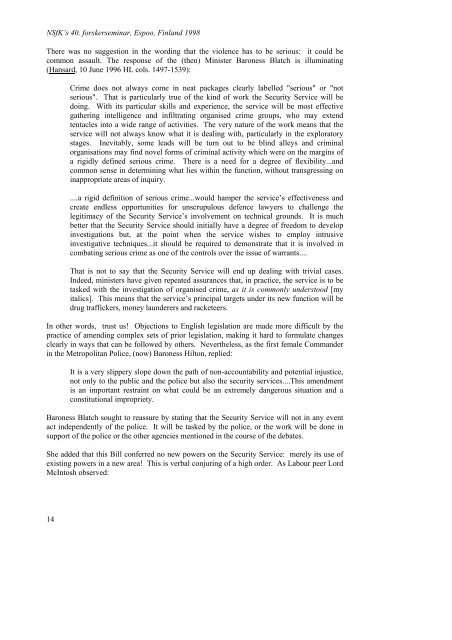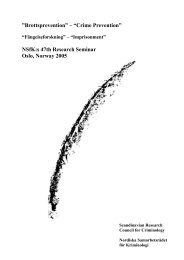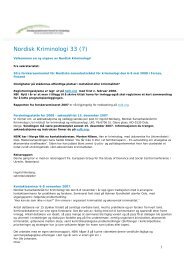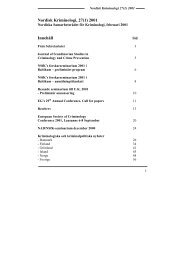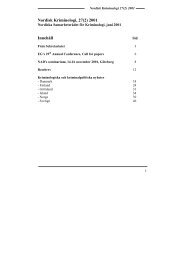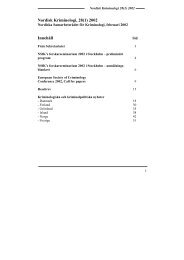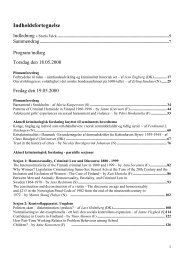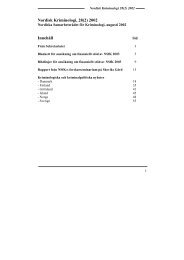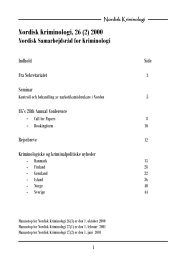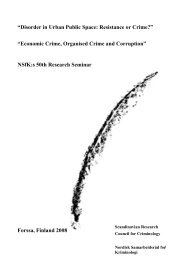Organised Crime & Crime Prevention - what works? - Scandinavian ...
Organised Crime & Crime Prevention - what works? - Scandinavian ...
Organised Crime & Crime Prevention - what works? - Scandinavian ...
Create successful ePaper yourself
Turn your PDF publications into a flip-book with our unique Google optimized e-Paper software.
NSfK’s 40. forskerseminar, Espoo, Finland 1998<br />
There was no suggestion in the wording that the violence has to be serious: it could be<br />
common assault. The response of the (then) Minister Baroness Blatch is illuminating<br />
(Hansard, 10 June 1996 HL cols. 1497-1539):<br />
14<br />
<strong>Crime</strong> does not always come in neat packages clearly labelled "serious" or "not<br />
serious". That is particularly true of the kind of work the Security Service will be<br />
doing. With its particular skills and experience, the service will be most effective<br />
gathering intelligence and infiltrating organised crime groups, who may extend<br />
tentacles into a wide range of activities. The very nature of the work means that the<br />
service will not always know <strong>what</strong> it is dealing with, particularly in the exploratory<br />
stages. Inevitably, some leads will be turn out to be blind alleys and criminal<br />
organisations may find novel forms of criminal activity which were on the margins of<br />
a rigidly defined serious crime. There is a need for a degree of flexibility...and<br />
common sense in determining <strong>what</strong> lies within the function, without transgressing on<br />
inappropriate areas of inquiry.<br />
....a rigid definition of serious crime...would hamper the service’s effectiveness and<br />
create endless opportunities for unscrupulous defence lawyers to challenge the<br />
legitimacy of the Security Service’s involvement on technical grounds. It is much<br />
better that the Security Service should initially have a degree of freedom to develop<br />
investigations but, at the point when the service wishes to employ intrusive<br />
investigative techniques...it should be required to demonstrate that it is involved in<br />
combating serious crime as one of the controls over the issue of warrants....<br />
That is not to say that the Security Service will end up dealing with trivial cases.<br />
Indeed, ministers have given repeated assurances that, in practice, the service is to be<br />
tasked with the investigation of organised crime, as it is commonly understood [my<br />
italics]. This means that the service’s principal targets under its new function will be<br />
drug traffickers, money launderers and racketeers.<br />
In other words, trust us! Objections to English legislation are made more difficult by the<br />
practice of amending complex sets of prior legislation, making it hard to formulate changes<br />
clearly in ways that can be followed by others. Nevertheless, as the first female Commander<br />
in the Metropolitan Police, (now) Baroness Hilton, replied:<br />
It is a very slippery slope down the path of non-accountability and potential injustice,<br />
not only to the public and the police but also the security services....This amendment<br />
is an important restraint on <strong>what</strong> could be an extremely dangerous situation and a<br />
constitutional impropriety.<br />
Baroness Blatch sought to reassure by stating that the Security Service will not in any event<br />
act independently of the police. It will be tasked by the police, or the work will be done in<br />
support of the police or the other agencies mentioned in the course of the debates.<br />
She added that this Bill conferred no new powers on the Security Service: merely its use of<br />
existing powers in a new area! This is verbal conjuring of a high order. As Labour peer Lord<br />
McIntosh observed:


